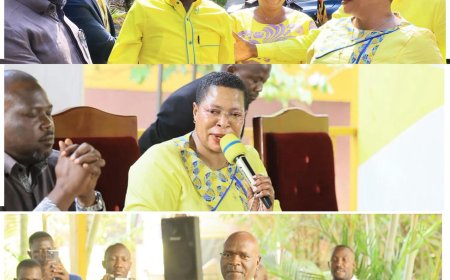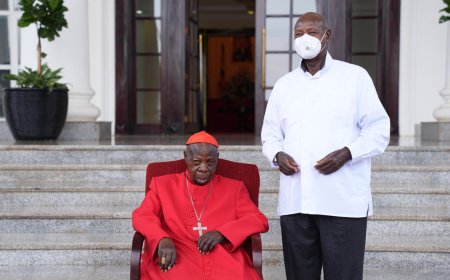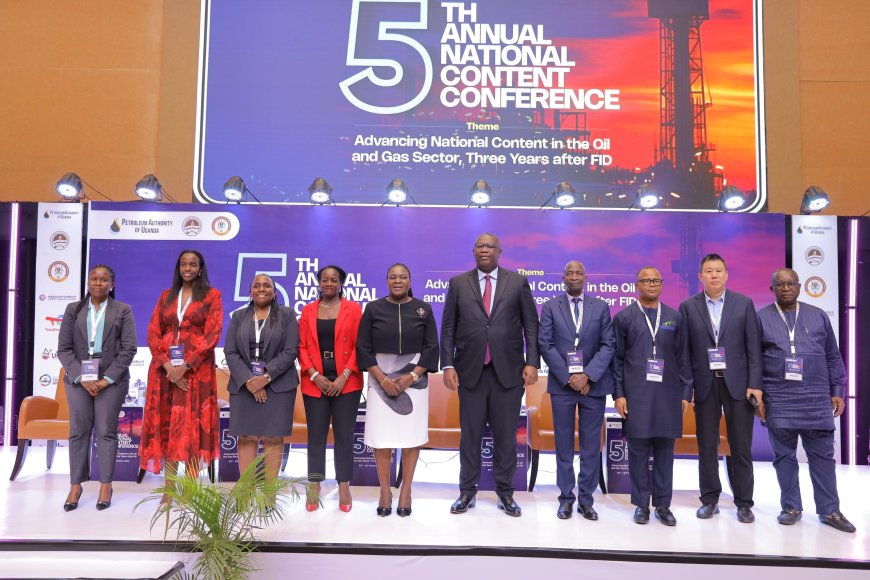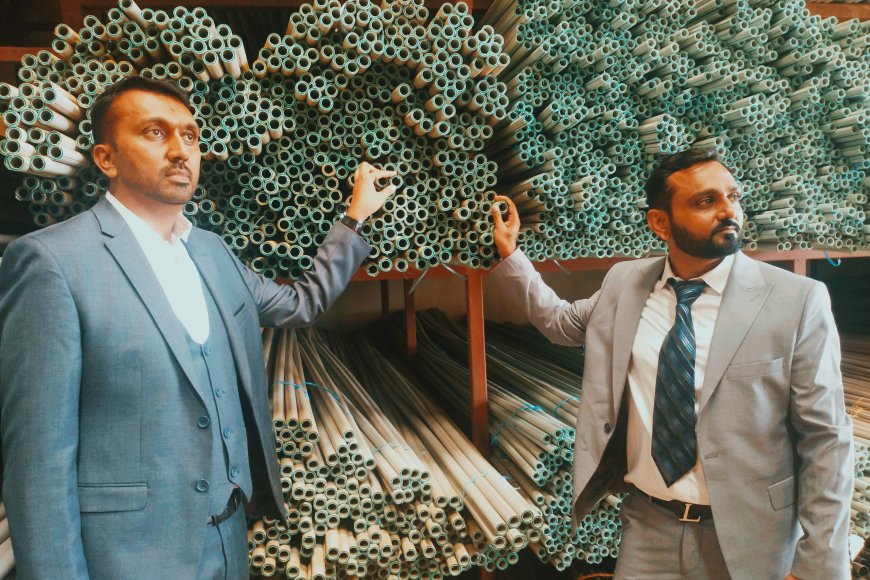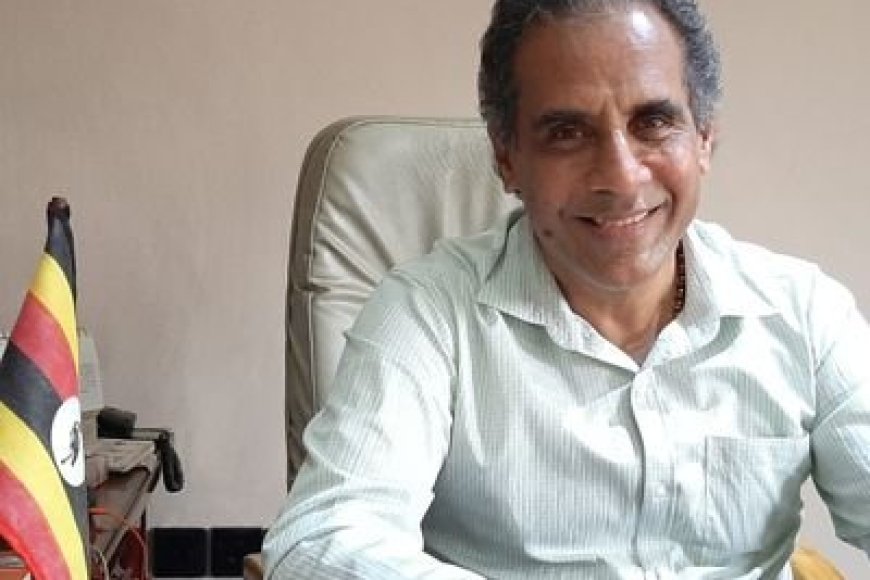Petroleum Commission of Ghana Advises Uganda on how to Succeed in the Oil Industry
The Petroleum Commission of Ghana has shared a wealth of experience with The Petroleum Authority of Uganda, the Government and Stakeholders on how to thrive through the oil industry
Mr. Egbert Faibille Jnr, Chief Executive Officer of the Petroleum Commission Ghana, narrated how Ghana achieved a record first oil in 3 years, in the year 2010 after commercial discovery was announced of the Jubilee Field in 2007, at Speke Resort hotel Munyonyo during a two days, 5th Annual National Content Conference.
The theme for this year's conference is “Advancing National Content in the Oil and Gas Sector, Three Years After FID.”
He expressed , on Thursday, how It is admirable that Uganda has taken time to put necessary structures including local content regulatory framework prior to the approval of Plan of Development and subsequent Final Investment Decision by Operators. The declaration of FID by Total Energies EP Uganda, CNOOC Uganda Limited, the Uganda National Oil Company (UNOC), and the Tanzania Petroleum Development Corporation (TPDC) with the commitment of JV partners to deliver first oil by 2025 was a significant milestone for the upstream petroleum industry in Uganda.
This marks an important epoch in the petroleum industry as it represents the point at which investor parties commit significant financial resources to proceed with project execution. With FID reached, the Contractor parties have given a full notice to proceed with the project and all EPC contracts would be tendered for and awarded. It is at this time that national content and indigenous participation should be paid all needed attention, said Mr. Egbert.

He, however, shared experience from Ghana's National content Story and said that Only last week, the media in Ghana was replete with news that a total of contracts worth US$ 3.6BN have been awarded to Indigenous Ghanaian Companies from 2007 when Ghana’s Jubilee Field commenced production in 2010. Still In the same period, US$ 8.7BN worth of contracts have been awarded to foreign companies whilst Joint Venture Companies have been awarded contracts valued at 6.3BN.
"Ghana as you may know, currently has three producing fields, namely, the Jubilee Field and the TEN Fields operated by Tullow Ghana Limited, as well as the Sankofa Gye Nyame Fields, operated by Eni Ghana Exploration and Production. All of these three named Fields are offshore. Over the last 11 years, the Petroleum Commission has made giant strides in the quest to deepen local or national content in Ghana’s upstream petroleum sub-sector."
He also emphasized, as he proceeded to share with Uganda some of the insights and experiences that have earned Ghana's local or national content regime the acclaim it basks in.
Contracts awarded to Indigenous Ghanaian Companies (IGCs) to conduct several upstream petroleum businesses have improved significantly over the last 11 years with IGCs and JV companies being awarded 21% and 33% of contracts respectively in the industry, Mr. Egbert added.
The values of contracts awarded IGCs and JV companies involving Ghanaian companies stood at US$3.6 billion and US$6.3 billion respectively out of total contracts of US$18.6 billion.
However, In 2023, out of a total contract sum of about USD967 million, about USD246 million was awarded to Ghanaian businesses representing 25% of the total contracts awarded. Aside this, the value of services to JVs was USD686 million which also includes significant Ghanaian equity participation. Further, over 650 IGCs have registered with the Petroleum Commission to provide various goods and services to the industry. This represents a 600% increase from a decade ago, he described.

Most importantly, IGCs in response to the Commission’s admonitions are now moving away from the “low hanging fruits” segment of the industry to relatively more sophisticated activities, such as engineering studies, metal stamping and blending, fabrication, thermal absorption plants, cementing units, chemical blending plants, filtration and mudlogging plants, production of specialty chemicals, manufacture of valves, bolt and nuts as well as acquisition of vessels for the provision of anchor handling and tug services, to mention but a few.
Mr. Egbert highlighted Key Initiatives on how Ghana made its progress and said that the strides, have been as a result of deliberate strategies and initiatives aimed at developing local capabilities and maximisation of Ghanaian participation in the oil and gas sector, that includes.
The Stakeholder Engagement. Following the passage L.I 2204, the Commission embarked on comprehensive stakeholder engagement on the contentious provisions of the L.I. and to seek stakeholder input and cooperation in its implementation. This exercise went well as we were able to clarify various provisions of concern to our partners and solicited best endeavour responses from the IOCs as well as International Services Companies (ISCs).
The Provision of Directions on Contracting Strategies like Unbundling Contracts. The upstream petroleum industry is well known for the award of big contracts. The average offshore contract in this industry may be valued at US50M – US$100M. There are certainly good technical and economic reasons for having big scopes per contract. However, the modern approach to Supply Chain management suggests that efficiency and value are created when companies utilize the services of small firms. These firms have low overhead costs and are able to respond quickly to the needs of their clients. Thus, the Commission pursued a strategy of unbundling and not to use ease of contract administration as an excuse for big scope per contract at the disadvantage of IGCs. This strategy has ensured that more companies get to execute bits of the scopes of big contracts as opposed to such contracts being awarded to just one company.
The Reservation of certain Goods and Services. The Commission, to ensure that IGCs get a bit of the pie, has reserved the provision or supply of certain goods and services exclusively for indigenous Ghanaian companies. Currently the provision of some 50 goods and services are exclusively reserved for Ghanaian Companies.
The Technology Transfer. Innovation, knowledge and technology are key priorities when Ghana prepares local companies to face international competition and win contracts.
It is a known fact that technologies utilised in the upstream petroleum industry reside with International Oil and Service Companies who due to licensing and patent restrictions on technologies among others are often unwilling to transfer such technologies to local entities.
Not oblivious to this reality, the requirement for the formation of joint ventures and other forms of partnerships in the Ghana’s Petroleum (Local Content and Local Participation) Regulations, 2013 (L.I.2204) was largely to promote the transfer of technology, skills, and know-how the Ghanaians and Ghanaian businesses in petroleum operates.
Ghana has developed a robust Policy and Regulatory Frameworks that favours the transfer of technology and know-how in the industry. Clear legal and regulatory frameworks that support local use of international technologies, licensing, and incremental innovation while at the same time ensuring that the regulatory framework is not overly aggressive to discourage foreign investment have been deliberately instituted. It is also important that such legal and regulatory frameworks protect intellectual property rights to encourage international oil and service companies to share their technology.
Ghana’s legal framework makes provisions for fiscal incentives for technology transfer to companies which aim to develop technological capacities, skills, and establish factories and production facilities in the industry.
The Utilisation of In-country Allied Services. Related to the above, is the need to use the services of the local insurance and banking sectors for the conduct of petroleum operations in the country. The Commission in conjunction with Ghana’s National Insurance Commission (NIC) has developed Insurance Guidelines named ‘Oil and Insurance Placement for the Upstream Sector’ to address challenges of low in-country insurance placements. The Guideline mandates that all insurable risk relating to petroleum activities should be placed through indigenous insurance companies. From a low in-country oil and gas insurance underwriting of less than 3% eight years, Ghana now has in-country premium retention of over 15%.
The Insurance Guidelines and the Protocols in place have helped the growth of the insurance market by providing the mechanism for the Oil and Service companies to retain a substantial portion of oil and gas insurance premium in-country.
He added that Ghana is currently working with the banking sector, as well as the sector regulator, the Bank of Ghana to develop similar Guidelines for the financial sector
The Development of Guidelines & Reporting Templates. L.I. 2204, requires all companies operating in the upstream sector to periodically submit to the Commission for review a number of reports. The Commission has developed a number of reporting templates in order to ensure uniform reporting format among companies, simplify the reporting process, enable a standard method for evaluating Local Content Plans and performance and thereby also minimise the volumes of information Commission receives.
Further the Commission has developed a number of Guidelines to ensure effective implementation of the regulations.
The Local Content Monitoring. One key challenge in ensuring compliance with the statutory requirements was the absence of a robust monitoring and inspection regime. Consequently, the Commission set up a Monitoring Department about 5 years ago to enhance enforcement and compliance with the regulations. The Monitoring & Evaluation department does not only verify compliance levels on desk, but undertake periodic field visits as well.

The Minister for Energy and Mineral Development, Hon. Ruth Nankabirwa also took the advantage to announce during the event that Uganda is now among the established countries in the world when it comes to petroleum production.
With an estimated volume of 6.5 billion barrels of oil equivalent initially in place and 1.4 billion barrels recoverable, these resources discovered to date are sufficient to support the commercial production of petroleum in the country, Hon. Nankabirwa said during her opening remarks.
She, however, noted four key projects that are being implemented to develop, produce and commercialize Uganda's oil and gas resources in the short to medium term that include, the Tilenga Project, the King fishery project, the Refinery Project (60,000bbl/day in west of the country, includes 213km refined products pipeline) where negotiations are ongoing on commercial agreements with the partner and the East African Crude Oil Pipeline (EACOP), 1,443km long, 24-inch diameter from Hoima, Uganda to Tanga, Tanzania.
The minister, mentioned about the implementation of the oil and gas projects in Uganda, that presents enormous opportunities for fast tracking the country's development through, among other options, the participation of Ugandans and Ugandan enterprises in providing the required goods and services, were such participation is also referred to as National Content.
The key areas of focus in progressing national content as earlier emphasized by the Executive Director of petroleum Authority Uganda includes employment of Ugandans, capacity building, enterprise development, use of locally produced goods and services together with transfer of knowledge and technology. Government is working with the private sector and development partners to achieve national content and inclusive growth through a number of strategies, she included.
On the issue of employment and capacity building, the minister explained that priority for employment is given to Ugandans at all levels, but with focus on the communities hosting the operations.
It is expected that about 160,000 people will be employed. By end of June 2024, fourteen thousand four hundred fifty-one (14,451) people were directly employed by Licensed Oil Companies, their contractors and sub-contractors. Of these, thirteen thousand forty-eight (13,048) are Ugandans (90%), among whom four thousand four hundred eight-three (4,483) employees where from the communities where oil and gas activities are being undertaken.
"Over 300 Government officers have been trained in various Oil and Gas training programs including Petroleum Engineering, Geology, Geophysics, Law, Economics, Taxation, Auditing, and Finance among others. These have been key in the management and decision making in the Oil and Gas Sector to date."
She also Commended the licensed oil companies and their contractors that have and continue to support national content initiatives as well as the implementation of various corporate social responsibility initiatives as part of the contribution to economic and social development of the communities in which they operate

